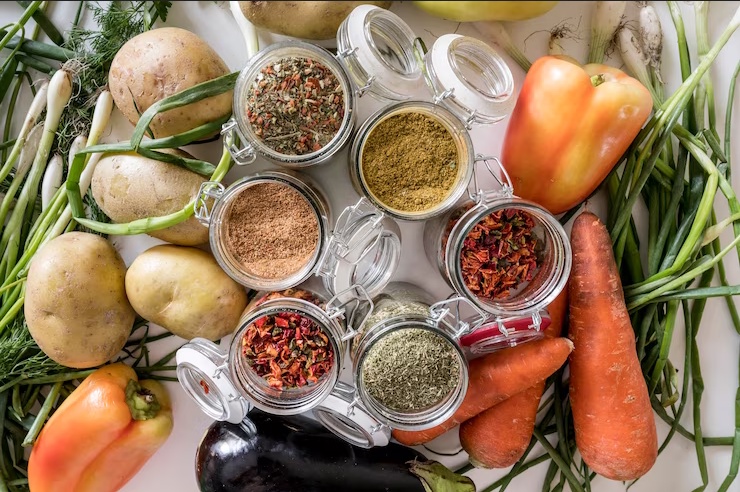Introduction:
In the quest for sustainable living, the journey from garden to plate embodies the essence of responsible food consumption. Central to this journey is the utilization of natural preservatives, which play a pivotal role in enhancing food sustainability. This article explores the significance of natural preservatives in the context of food sustainability, elucidating their benefits and the imperative of embracing them in our culinary practices.
Understanding Natural Preservatives:
Natural preservative encompass a diverse array of substances derived from plant extracts, herbs, spices, and other natural sources, utilized to prolong the shelf life of food products while preserving their safety, flavor, and nutritional value. Unlike synthetic preservatives, which may contain artificial additives and chemicals, natural preservatives offer a safer and more sustainable alternative for food preservation.
The primary function of natural preservatives is to inhibit the growth of microorganisms, including bacteria, fungi, and molds, which can spoil food and compromise its safety and quality. By harnessing the antimicrobial properties of botanical extracts and essential oils, natural preservatives effectively prevent microbial proliferation, thereby extending the shelf life of perishable food items.
Moreover, natural preservatives serve as antioxidants, combating oxidative deterioration and preserving the freshness and nutritional integrity of food products. Antioxidant-rich ingredients such as vitamin C, tocopherols, and polyphenols protect against lipid oxidation and maintain the sensory attributes and stability of food items during storage.
Benefits of Natural Preservatives for Food Sustainability:
The utilization of natural preservatives offers a multitude of benefits for food sustainability, encompassing environmental, economic, and social dimensions. By reducing food waste, enhancing resource efficiency, and promoting ecological resilience, natural preservatives contribute to a more sustainable and resilient food system.
One of the primary benefits of natural preservatives is their minimal environmental impact. Unlike synthetic counterparts, which may persist in the environment and contribute to pollution and ecosystem degradation, natural preservatives are biodegradable and eco-friendly, minimizing their ecological footprint.
Furthermore, natural preservatives promote biodiversity and ecosystem health by encouraging the cultivation of diverse plant species and traditional agricultural practices. By harnessing the inherent antimicrobial and antioxidant properties of botanical extracts and herbs, natural preservatives support agroecological principles and sustainable farming methods.
Moreover, the adoption of natural preservatives fosters a more equitable and inclusive food system by empowering small-scale farmers and local food producers. By prioritizing locally sourced, minimally processed ingredients preserved with natural preservatives, consumers can support community-based food systems and reduce their dependence on industrialized agriculture.
Promoting Health and Wellness:
In addition to their environmental and social benefits, natural preservatives contribute to health and wellness by ensuring the safety, quality, and nutritional integrity of food products. Unlike synthetic additives, which may contain potentially harmful chemicals and allergens, natural preservatives are generally recognized as safe and suitable for individuals with dietary restrictions or sensitivities.
Moreover, natural preservatives are rich in bioactive compounds with potential health-promoting properties, including antimicrobial, anti-inflammatory, and antioxidant effects. Herbs, spices, and botanical extracts such as garlic, rosemary, and green tea possess potent antimicrobial properties, which may help prevent foodborne illnesses and promote digestive health.
Furthermore, the utilization of natural preservatives supports the consumption of minimally processed, nutrient-dense foods, contributing to a more balanced and wholesome diet. By preserving the freshness and nutritional quality of fruits, vegetables, and other perishable food items, natural preservatives facilitate access to healthy and sustainable food choices for individuals and communities.
Conclusion:
From garden to plate, the incorporation of natural preservatives embodies the essence of food sustainability, fostering environmental stewardship, social equity, and personal well-being. By harnessing the antimicrobial and antioxidant properties of botanical extracts, herbs, and spices, natural preservatives play a vital role in extending the shelf life of perishable food items while preserving their safety, flavor, and nutritional value.
Moreover, the adoption of natural preservatives promotes biodiversity, supports local food systems, and reduces the ecological footprint of food production and consumption. By embracing the role of natural preservatives in our culinary practices, we can create a more sustainable and resilient food system that nourishes both people and the planet. Let us embark on a journey towards food sustainability by embracing the benefits of natural preservatives and celebrating the abundance of nature's bounty.


No comments yet